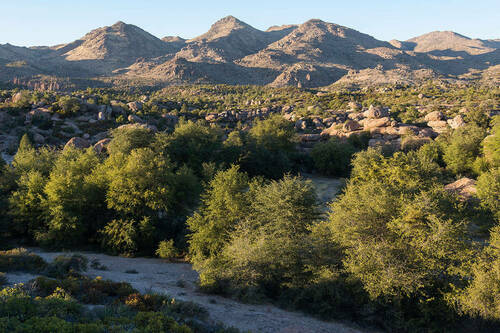
The Notre Dame Law School Religious Liberty Initiative has filed an amicus brief in the United States District Court in the case Apache Stronghold v. United States of America. The brief argues in favor of religious liberty protections for Oak Flat, an Indigenous sacred site in Arizona being threatened with destruction.
The brief was filed by Notre Dame Law Associate Professor Stephanie Barclay, a First Amendment scholar who directs the Law School’s Religious Liberty Initiative, along with the Religious Liberty Initiative’s student cohort. “Our brief highlights a history of callousness and coercion against Indigenous sacred sites like Oak Flat. Our religious freedom laws wouldn’t allow the government to demolish churches with impunity, and the same should be true of a site that has been sacred to the Apache people for generations,” Barclay said. The brief represents Ramon Riley, the White Mountain Apache Tribe cultural resource director; the Morning Star Institute; and the MICA (Multicultural Initiative for Community Advancement) Group.
“Notre Dame’s campus is blessed with many sacred places: from the Grotto of Our Lady of Lourdes to the Basilica of the Sacred Heart. But for the Apache people, there is only one Oak Flat,” said Dan Loesing, a second-year law student who took a lead role on this brief. “It's an honor to work to protect this historic sacred site and the free exercise of rights of those who gather there for prayer and religious ceremonies.”
In Apache Stronghold v. United States of America, the District Court of Arizona may decide whether the ramifications of the Resolution Copper Project meet the “substantial burden” requirements of the 1993 Religious Freedom Restoration Act. The amicus brief filed by the Notre Dame Law School Religious Liberty Initiative pushes back against arguments by the government that would provide basically no religious freedom protections for Indigenous sacred sites, and that would result in disparate treatment between those sites and other similar types of non-Indigenous religious exercise.
Alexandra Howell is a third-year law student at Notre Dame who also helped with the brief. She explained, “While what is sacred to majority culture and religion is generally safe from government interference, minority religious groups do not have this same guarantee. Our amicus brief made me think about how the Apache burial site located at Oak Flat is akin to Arlington National Cemetery in Washington, D.C. This section of the brief is a crucial reminder of how easy it is to disregard the need for others’ beliefs to receive protection when they look different from our own.”
The troubling pattern of lack of protection for Indigenous sacred sites is something of particular interest to Barclay. Together with co-author Michalyn Steele, Barclay on Wednesday wrote a Harvard Law Review article that argued Indigenous people should be able to more easily make a claim of a substantial burden under RFRA in order to correct certain inequalities in the law. “Allowing Indigenous peoples to demonstrate a substantial burden on their religion on the same basis as other religious groups does not in any way guarantee that they will always win their case. Rather, it simply requires government to actually justify its burdens, and it incentivizes government to be more protective of sacred sites if it can be,” the article argues.
“We are so grateful and honored that Notre Dame is helping the Apache in our time of greatest need,” said Apache Stronghold leader and former San Carlos Apache Tribal Chairman Wendsler Nosie Sr. “The government is saying that destruction of Chi'chil Bildagoteel will not be a serious problem for us when its destruction will force us to stop practicing our religion.”
The photo at the top of this page is by Elias Butler.
Originally published by at law.nd.edu on Feb. 11.
